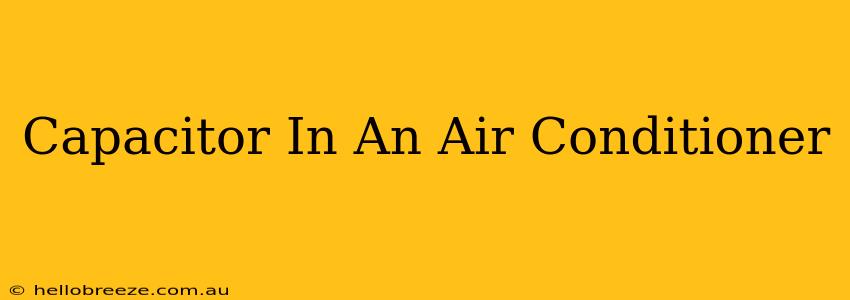Air conditioners are essential for maintaining comfort, especially during scorching summer months. Understanding the components within your AC unit is key to ensuring its longevity and efficient operation. One often overlooked yet crucial component is the capacitor. This article will delve into the vital role of a capacitor in your air conditioner, exploring its function, common problems, and how to identify when replacement might be necessary.
What is a Capacitor in an Air Conditioner?
A capacitor, in the context of an air conditioner, is an electrical component that stores energy in an electric field. Think of it as a temporary energy reservoir. In an AC unit, it's not just one capacitor but several, each playing a specific role in enabling the compressor and fan motor to function correctly. Specifically, they are crucial for starting and running these vital components.
Types of Capacitors in AC Units:
-
Start Capacitor: This capacitor provides a large burst of energy needed to initially start the compressor motor. This initial surge helps overcome the inertia and resistance to get the motor spinning. Once the motor is running, the start capacitor is typically disengaged.
-
Run Capacitor: The run capacitor is constantly connected to the compressor motor while it's operating. It improves the motor's performance and efficiency, ensuring consistent operation and reducing energy consumption.
-
Fan Capacitor: Similar to the compressor, the fan motor also frequently utilizes a capacitor, particularly in larger units. This aids in starting and maintaining efficient operation of the blower fan.
How Does a Capacitor Work in an Air Conditioner?
The capacitor works by storing electrical energy and then releasing it rapidly when needed. This rapid release of stored energy provides the extra power required to overcome the high starting torque demanded by the compressor and fan motors. This results in smooth starts and consistent performance.
Signs Your Air Conditioner Capacitor Needs Replacing
A faulty capacitor can significantly impact your AC's performance and may even cause complete failure. Here are some telltale signs that indicate your capacitor may be on its way out:
-
Compressor won't start: This is a common symptom, especially during hot weather. The capacitor may not be providing enough energy to initiate the compressor.
-
AC runs intermittently: The AC may cycle on and off frequently, suggesting the capacitor is struggling to maintain consistent power.
-
Humming noise from the compressor: A humming sound indicates the motor is struggling to start correctly, often a clear sign of a failing capacitor.
-
Overheating: If your AC unit is overheating, it could be due to the lack of sufficient power delivery from a faulty capacitor, causing the motor to work harder and potentially overheat.
-
Reduced cooling capacity: A malfunctioning capacitor can lead to weak airflow and reduced cooling, failing to meet your desired temperature.
The Importance of Capacitor Maintenance
While capacitors are relatively durable, they are subject to wear and tear over time. Regular AC maintenance includes checking the capacitor's condition, looking for bulging or leaking capacitors, and ensuring its proper connection. While attempting self-repair can be dangerous and void warranties, understanding these signs will help you communicate effectively with a qualified HVAC technician.
Conclusion: Ensuring Smooth Operation
The capacitor is an integral component within your air conditioner's system. Understanding its function and recognizing signs of failure can help you maintain a comfortable and efficiently-running AC unit. Remember, professional assistance is crucial when diagnosing and replacing capacitors. Don't delay – a faulty capacitor can lead to further damage and costly repairs down the line.

